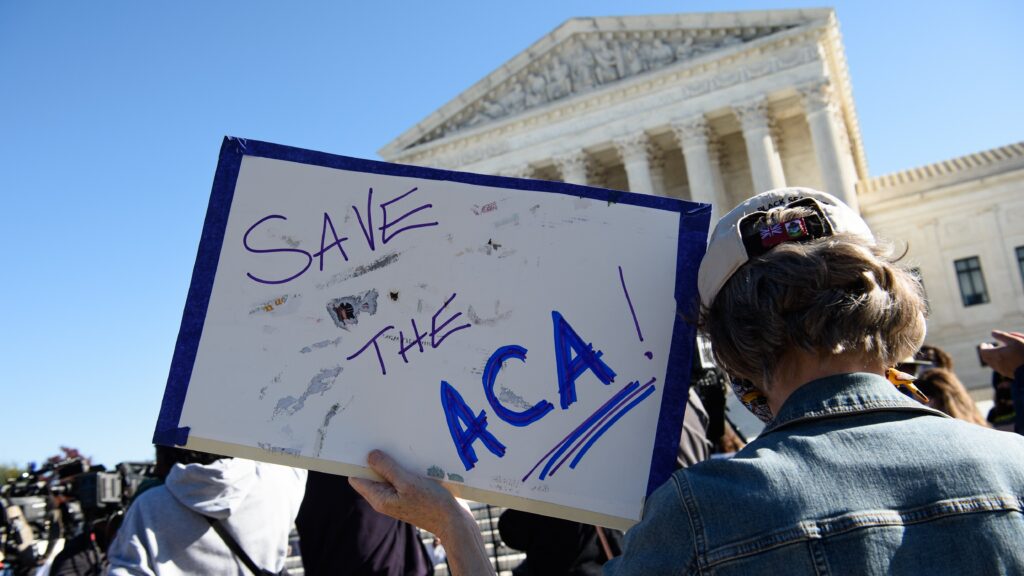This is the online version of STAT’s email newsletter Health Care Inc, delivered to your inbox every Monday. Sign up here.
Hello, and thanks for letting me crash in your inbox. I’m still posting on the site formerly known as Twitter, proof that old habits are hard to break. But it’s evident more people have added Bluesky to their social media diet. You can follow me on both Twitter and Bluesky, where hopefully my STAT colleagues and I can be a healthy part of that diet. And for those who still like the eloquence of email: [email protected].
advertisement
Industry’s wishful thinking on ACA subsidies
Republicans hate the Affordable Care Act. They tried to repeal it in 2017 (and failed). And yet, some health care executives say Republicans may actually help the law as they regain control of Washington.
Biden signed laws that created enhanced tax credits for middle-income Americans, which lower premiums for plans on the ACA’s individual marketplaces. But those subsidies expire at the end of 2025. “I’d be hard-pressed to believe that they come in and take a lot of benefits away from the folks who just put them into office,” Kevin Hammons, CFO of hospital chain Community Health Systems, said at an investor conference last week.
The health care industry’s interest isn’t necessarily rooted in political analysis. It’s financial: Those subsidies are worth $25 billion annually. Insurance companies that sell ACA plans retain some of that federal spending as profit. Hospitals and doctors who treat patients with ACA coverage benefit because those plans pay higher rates than other federal insurance programs and because the subsidies encourage people to stay insured.
advertisement
“There is a vested financial stake,” said Adrianna McIntyre, a health policy professor at Harvard University. Read more about the industry’s wishful thinking on the extension of the enhanced ACA subsidies.
The hammer comes down on Amedisys deal
The Department of Justice and four state attorneys general officially sued to block UnitedHealth Group’s $3.3 billion takeover of home health and hospice giant Amedisys.
The DOJ’s complaint has some scintillating allegations, including that UnitedHealth paid Amedisys’ $106 million breakup fee that it owed to Option Care Health (Amedisys and Option Care agreed to a deal before UnitedHealth swooped in). It’s also a big decision because the DOJ did not rubber-stamp the proposed remedy, arguing instead that home health and hospice services would be monopolized in many communities across the country should the deal go through.
The big question is, what’s next? Will Trump’s DOJ, possibly helmed by Matt Gaetz, continue this lawsuit? If the past is precedent, said James Kovacs, an attorney at antitrust law firm Shinder Cantor Lerner, nothing should change. “The standard practice is to let investigations and complaints continue on,” he said. “I don’t perceive just because of a change of administration that this complaint is going to go away.”
Jonathan Kanter’s health care soliloquy
On the same day that DOJ sued UnitedHealth, the agency’s top antitrust official, Jonathan Kanter, was in Pittsburgh at Carnegie Mellon University giving one of the most forceful speeches on health care you’ll ever see.
UnitedHealth was clearly on Kanter’s mind, but no part of the industry was spared. He criticized monopolies and monopsonies, and he called out “perverse incentives, conflicts of interest, and opportunities for self-preferencing, steering, and self-dealing.” But he ended the speech with a dire warning:
“In health care markets, I foresee a not-so-distant future where a few integrated health care platform stacks will amass a generational hold over health care. It would be a private single payer without any of the oversight, impartiality, or scrutiny attendant to government health insurance programs. In 2010, the big insurers promoted the narrative that single payer was a threat to Americans. Nearly 15 years later, we may well be accelerating the march to single payer, just not the kind anyone imagined in 2010, or wants today.”
The entire speech, and a chat between Kanter and Carnegie Mellon economist and antitrust expert Marty Gaynor, can be watched here on YouTube. (During that sitdown, Gaynor, who is advising at DOJ, asked what Kanter’s thoughts were on those in the industry who say consolidation is necessary to improve coordination and eliminate fragmentation: “I just think that’s a fictional narrative,” Kanter said. “It’s just not true.”)
Hospital lightning round
A cornucopia of nonprofit hospital systems shared third-quarter financial reports last week. The upshot: Patients are still getting a ton of services and care. That’s benefiting most hospitals, except for those that also own a health insurance company and have to pay out more in medical claims to competitors. My colleague Tara Bannow mined the quarterly reports for a handful of systems.
- Advocate Health: Advocate is capitalizing on the boost in patient volumes. Insurers also are more commonly paying a higher rate for hospitalized Medicare patients under a new rule, so Advocate’s observation cases (visits paid under a lower rate) were down 20% year-over-year.
- Corewell Health: Corewell, a Michigan-based system, owns a health insurer called Priority Health. And the same higher patient numbers that are boosting Corewell’s peers are forcing it to pay out more for members’ care. The system’s operating margin was 1.7% in the latest quarter.
- Henry Ford Health: Another Michigan system, Henry Ford likewise is riding the wave of higher patient visits. Net patient service revenue grew almost 19%.
- Kaiser Permanente: Kaiser’s net margin in the first nine months of the year was at 12%, thanks in large part to its acquisition of Geisginger earlier this year. Kaiser still plans to add Cone Health by the end of this year.
- Sentara Healthcare: Sentara lost more than $500 million from operations in the first nine months of this year, a $900 million reversal from the same period in 2023. Sentara, which operates in Virginia and North Carolina, blamed the loss on post-Covid Medicaid redeterminations and explained that insurance rules required it to record a $300 million loss it expects in 2025 in the current period.
‘A lot of conflict right now’
Jon Blum is the current No. 2 at the Centers for Medicare and Medicaid Services, behind Administrator Chiquita Brooks-LaSure. Both of them likely will be out once the Trump administration takes over next year.
Blum is soft-spoken and usually sticks to a “value-based” script. He appeared at a conference last week and had some choice words for health insurers and providers (albeit not as blunt as Kanter). Reading between the lines, maybe — just maybe — everything isn’t as “value-based” as industry claims it is:
“There is a lot of conflict right now within the health care delivery system,” Blum said. “Whether it’s over prior authorization or how to implement the contracts that get signed every year. But I think we need to work harder, think better for how we build true collaboration systems.”
Industry odds and ends
- Perhaps you’ve been on a spelunking trip for the past week and are just getting out of the caves. In that case, Trump has nominated RJK Jr. as secretary of the Department of Health and Human Services. My colleague Sarah Owermohle has more.
- Cardinal Health has agreed to acquire a majority stake in GI Alliance, a network of gastroenterology practices. The company didn’t disclose financial terms, but the deal values GI Alliance at $3.9 billion. I guess this is another one that would raise red flags with Sen. Elizabeth Warren, who wrote a letter to the Federal Trade Commission last month to closely scrutinize these kinds of deals.
- Lost in the shuffle over the past week: Medicare Part B premiums will be going up by 6% next year. That’s not a small increase for older adults who live on fixed incomes. The main culprits behind the increase: spending related to hospital outpatient services and drugs administered in physician offices.
- There are now one trillion lawsuits (approximately) associated with the 340B drug discount program following new ones from Johnson & Johnson and Eli Lilly against the government agency that administers the program. Read more on J&J and Lilly from my colleague Ed Silverman.
- University of Colorado Health paid $23 million to settle allegations that it automatically used the highest-paying medical code for emergency department visits. You can read the full settlement with the DOJ here.
- Provider directories within Medicare Advantage plans are still riddled with inaccuracies and unfairly leave beneficiaries stranded if insurers and providers terminate their contracts, Cheryl Clark of MedPage Today reports.
- People who are in their last year of life abandon their Medicare Advantage plans twice as often as others in MA, and that trend shifts billions of dollars in costs from insurers to taxpayers. More good work from the Wall Street Journal team.
The Meme Ward


